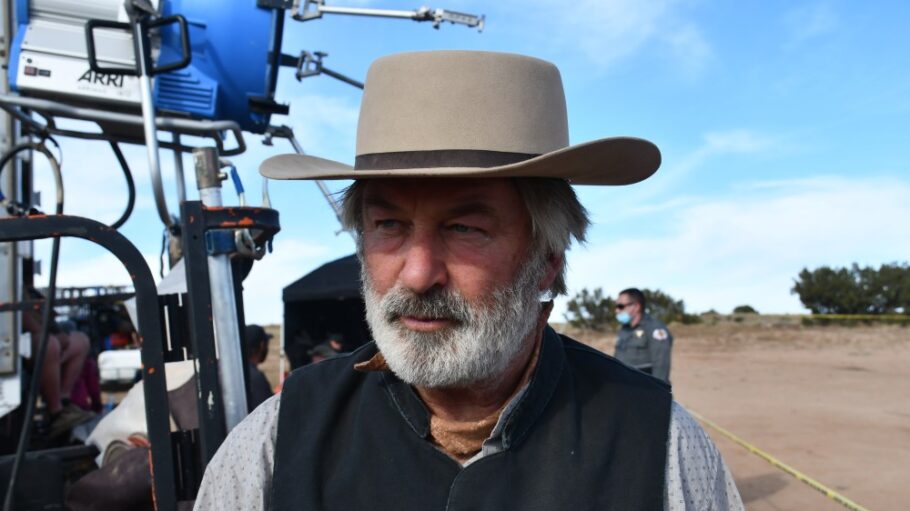Prosecutors intend to argue that Alec Baldwin could not control his emotions on the set of “Rust,” and that he “shamelessly lied” and repeatedly changed his story after accidentally shooting the film’s cinematographer.
The actor is due to go on trial in July in Santa Fe, N.M., on a charge of involuntary manslaughter for firing a prop gun and killing Halyna Hutchins. In a 32-page filing made public on Monday, prosecutor Kari Morrissey laid out the allegations against Baldwin in unprecedented detail.
She argued that Baldwin would scream and curse at himself and others on set, sometimes for no particular reason, and that his behavior contributed to safety failures.
“To watch Mr. Baldwin’s conduct on the set of ‘Rust’ is to witness a man who has absolutely no control of his own emotions and absolutely no concern for how his conduct affects those around him,” Morrissey wrote. “Witnesses have testified that it was this exact conduct that contributed to safety compromises on set.”
The prosecutor also argued that after the shooting, Baldwin set about constructing a false narrative that deflected responsibility onto others. The actor has claimed that he did not pull the trigger of the gun, which the prosecution maintains is “absurd on its face.”
Morrissey noted that Baldwin did not make that claim in his initial police interview, but only offered it more than a month later, in an interview with ABC’s George Stephanopoulos. In the Stephanopoulos interview, Baldwin also said that he pointed the gun at Hutchins only after she instructed him to — another claim that did not appear in his police interview.
“Every time Mr. Baldwin spoke, a different version of events emerged from his mouth, and his later statements contradicted his previous statements,” the prosecutor said, adding that Baldwin was effectively blaming Hutchins for her own death.
Love Film & TV?
Get your daily dose of everything happening in music, film and TV in Australia and abroad.
Baldwin’s defense team filed a motion to throw out the indictment last month, arguing that he had been subject to a litany of prosecutorial abuses. In response, Morrissey argued that the defense has engaged in “countless lies and manipulation” and has subjected her and co-counsel Jason Lewis to personal attacks.
Morrissey and Lewis were appointed to the case in March 2023, after a series of stumbles by D.A. Mary Carmack-Altwies and the original special prosecutor who charged Baldwin in January 2023.
In the filing released Monday, Morrissey detailed her reasons for dropping the felony charges against Baldwin last April, offering him a misdemeanor plea deal last fall, then withdrawing the offer and opting instead to indict him on a felony charge carrying an 18-month maximum prison term.
Soon after being appointed to the case, Morrissey said she “naively agreed” to meet with Baldwin’s attorneys. At the meeting, defense attorney Luke Nikas gave a PowerPoint presentation arguing that the pending manslaughter charge was unwarranted, and that the defense would call A-list actors, like Harrison Ford and Helen Mirren, to testify on Baldwin’s behalf, along with Jensen Ackles, Baldwin’s co-star on “Rust.”
Nikas also argued that Baldwin was merely a creative producer, without management authority over the set, and that Baldwin’s gun had been modified to make it more susceptible to firing without a trigger pull.
The defense ultimately persuaded the prosecutors to drop the charge, pending further testing on the gun. The prosecutors have since come to believe that much of the defense presentation was either false or misleading, and that Baldwin’s defense succeeded at delaying the case. For instance, they say the defense has not indicated it will call any of the A-list actors cited last year.
Subsequent forensic examination of the gun concluded that the trigger had to have been pulled in order to fire. However, prosecutors initially chose not to reinstate the felony manslaughter charge, but instead to offer a misdemeanor plea.
According to earlier filings in the case, Baldwin was offered the same terms as were extended to Dave Halls, the first assistant director who received unsupervised probation, and no jail time, after pleading to negligent handling of a deadly weapon.
In the filing, Morrissey said she made the offer “reluctantly,” but with the “intention of ensuring that similarly situated defendants do not receive disparate treatment.”
Morrissey noted that prosecutors are not obligated to treat criminal defendants similarly. She wrote that she is not a career prosecutor, but rather a defense attorney and civil rights lawyer who “believes strongly in issues related to fundamental fairness.”
“Undersigned counsel has learned some tough lessons about the consequences of her idealistic notions during her dealings with Baldwin’s counsel and the series of events that unfolded as a result of the plea offer have been the toughest lessons learned to date,” she wrote.
According to the filing, Baldwin’s defense planned to accept the plea while rolling out a media campaign to minimize his culpability, which would include the filing of a “frivolous” civil complaint against the original prosecutors and the state of New Mexico.
Morrissey also learned that Baldwin was planning a documentary about Hutchins, and was “actively pressuring material witnesses in the case” to be interviewed for it.
“It was at this point that the plea offer was rescinded,” she wrote, and she opted to take it to a grand jury.
Baldwin’s defense has alleged a series of procedural and legal defects with the subsequent indictment. Among other things, the defense contends that grand jurors were not sufficiently informed of their ability to hear from defense witnesses, who would testify that it was not Baldwin’s job to check the gun for live bullets.
The prosecutor countered that those objections are invalid, and that the indictment proceeded by the book.
From Variety US































